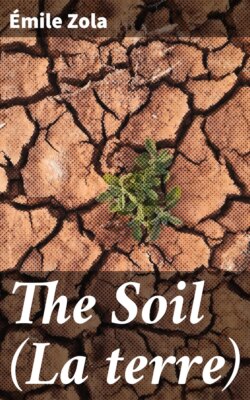Читать книгу The Soil (La terre) - Émile Zola - Страница 6
На сайте Литреса книга снята с продажи.
CHAPTER III.
ОглавлениеThe Fouans house was the first in Rognes, on the high-road from Cloyes to Bazoches-le-Doyen, which passes through the village. On Monday, the old man was going out at seven o'clock in the morning to keep the appointment in front of the church, when, in the next doorway, he perceived his sister, "La Grande," who was already astir, despite her eighty years.
These Fouans had propagated and grown there for centuries, like some sturdy luxuriant vegetation. Serfs in the old times of the Rognes-Bouquevals—of whom not a trace survived save the few half-buried stones of a ruined château—they had been emancipated, it appeared, under Philip the Fair; becoming thenceforward landowners of an acre or so, which they had bought from the lord of the manor when in difficulties, and paid for with tears and blood at ten times the value. Then had set in the long struggle of four hundred years to defend and enlarge the property, in a frenzy of passion transmitted from father to son: odd corners were lost and bought back, the ownership was unremittingly called into question, the inheritances were subject to such a list of dues that they almost ate their own heads off; but in spite of all, both arable and plough-lands grew, bit by bit, in the ever-prevailing, stubborn craving for possession. Generations passed away, the lives of many men enriched the soil; but when the Revolution of '89 set its seal upon his rights, the Fouan of the time, Joseph Casimir, possessed about twenty-six acres, wrested in the course of four centuries from the old seignorial manor.
In '93, this Joseph Casimir was twenty-seven years of age, and on the day when what remained of the manor was declared national property and sold in lots by auction, he yearned to acquire a few acres of it. The Rognes-Bouquevals, ruined and in debt, after letting the last tower of the château crumble into dust, had long since given up to their creditors the right of receiving the revenues of La Borderie, three quarters of which property lay fallow. In particular, adjacent to one of Fouan's bits of land there was a large field, on which he looked with the fierce covetousness of his race. But the harvest had been poor, and in the old pipkin behind his oven he had barely a hundred crowns saved up. Moreover, although it had momentarily occurred to him to borrow off a Cloyes money-lender, a distrustful prudence had stood in the way: he was afraid to touch these lands of the nobility; who knew whether they would not be claimed again later on? So it happened that, divided between desire and apprehension, he had the agony of seeing La Borderie bought at auction, field by field, and for a tenth of its value, by Isidore Hourdequin, a townsman of Châteaudun, formerly employed in the collection of excise duties.
Joseph Casimir Fouan, in his old age, had divided his twenty-six acres equally among his eldest child, Marianne, and his two sons, Louis and Michel; a younger daughter Laure, brought up to dressmaking and employed at Châteaudun, being indemnified in hard cash. But marriage destroyed this equality. While Marianne Fouan, surnamed "La Grande," wedded a neighbour, Antoine Péchard, with about twenty-two acres; Michael Fouan, surnamed "Mouche," encumbered himself with a sweetheart who only expected from her father two and a half acres of vineyard. On the other hand, Louis Fouan, joined in matrimony to Rose Maliverne, the heiress to fifteen acres, had acquired that total of twenty-three acres or so, which, in his turn, he was about to divide among his three children.
